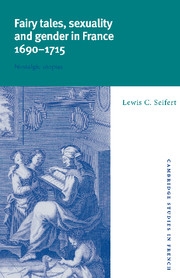Introduction
Published online by Cambridge University Press: 22 September 2009
Summary
Bien souvent les plaisirs de l'imagination
valent mieux que les plaisirs réels.
Charlotte-Rose Caumont de La ForceParadox is no stranger to fairy tales. They are at once among the most marginal and the most central of all cultural forms. On the one hand, they are only occasionally included in literary canons, if indeed they are understood to be “literature” at all. On the other hand, fairy tales are immediate, almost universal cultural references that reveal in succinct form some of the most significant of all psychic and social phenomena. Even more paradoxical, the reasons for the marginality of fairy tales are, at the same time, indications of their centrality. Consider but three of these reasons, (1) If a wide-spread prejudice holds fairy tales to be simplistic and unsophisticated, it is equally widely accepted, in the wake of structuralist theorists such as Propp, Greimas, and Brémond, that the repetitive and predictable features of the genre offer a highly condensed model of more elaborate narrative forms. (2) The escapism or retreat from reality prevalent in supernatural tales blatantly contravenes the dominant literary esthetic of realism and, by this standard, accords them less prestige. As fantasy literature, however, fairy tales can be said to outline the very contours and solidity of what we take to be “reality.” (3) Since fairy tales – even socalled literary fairy tales – are fully synonymous in our time with children's literature, they are usually not considered to be of primary interest to adults.
- Type
- Chapter
- Information
- Fairy Tales, Sexuality, and Gender in France, 1690–1715Nostalgic Utopias, pp. 1 - 18Publisher: Cambridge University PressPrint publication year: 1996



